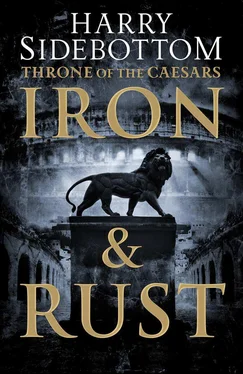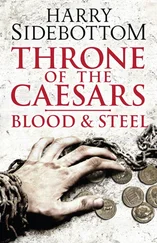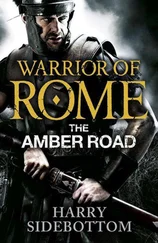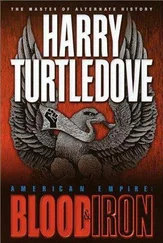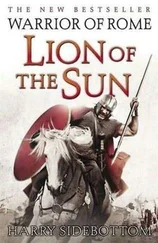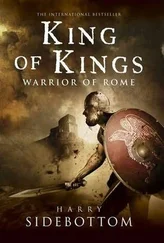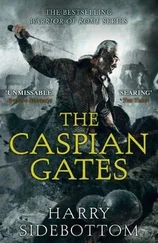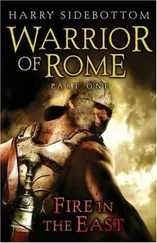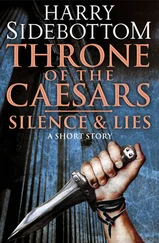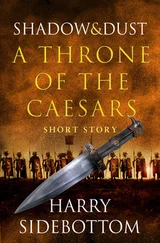Harry Sidebottom - Iron and Rust
Здесь есть возможность читать онлайн «Harry Sidebottom - Iron and Rust» — ознакомительный отрывок электронной книги совершенно бесплатно, а после прочтения отрывка купить полную версию. В некоторых случаях можно слушать аудио, скачать через торрент в формате fb2 и присутствует краткое содержание. Год выпуска: 2014, Издательство: HarperCollins Publishers, Жанр: Исторические приключения, на английском языке. Описание произведения, (предисловие) а так же отзывы посетителей доступны на портале библиотеки ЛибКат.
- Название:Iron and Rust
- Автор:
- Издательство:HarperCollins Publishers
- Жанр:
- Год:2014
- ISBN:нет данных
- Рейтинг книги:4 / 5. Голосов: 1
-
Избранное:Добавить в избранное
- Отзывы:
-
Ваша оценка:
- 80
- 1
- 2
- 3
- 4
- 5
Iron and Rust: краткое содержание, описание и аннотация
Предлагаем к чтению аннотацию, описание, краткое содержание или предисловие (зависит от того, что написал сам автор книги «Iron and Rust»). Если вы не нашли необходимую информацию о книге — напишите в комментариях, мы постараемся отыскать её.
Iron and Rust — читать онлайн ознакомительный отрывок
Ниже представлен текст книги, разбитый по страницам. Система сохранения места последней прочитанной страницы, позволяет с удобством читать онлайн бесплатно книгу «Iron and Rust», без необходимости каждый раз заново искать на чём Вы остановились. Поставьте закладку, и сможете в любой момент перейти на страницу, на которой закончили чтение.
Интервал:
Закладка:
The Romans could hardly be worse prepared. When the northern tribes had crossed the Rhine, Alexander’s advisers had stripped the East of troops. Mesopotamia had suffered as badly as anywhere. Notionally, Priscus still had two legions; the 1st and 3rd Parthica, based at Singara and Nisibis respectively. But the detachments that were marched west, combined with desertion and sickness, had reduced them to fewer than three thousand men each. The situation with the auxiliaries was worse. Unfortunately, the Osrhoene archers had distinguished themselves in Alexander’s war. As a result, the foolish councillors of that weak Emperor had ordered almost all of them hundreds upon hundreds of miles from their homes to fight the Germans. Neither the feelings of the soldiers nor the weakness created by their absence had been considered. There were just eight auxiliary units left. The pair of thousand-strong cavalry alae would be lucky to put that many in the saddle between them. The remaining six formations, cavalry and infantry alike, were all below their roster strength of five hundred. On the most optimistic estimate, Priscus had fewer than ten thousand regulars, and whatever levies he could raise, to defend his province. And now the new Emperor might demand yet more reinforcements for his expedition into the forests of Germania.
If any consolation were to be found, outside the specious posturing of the schools of philosophy or the messianic ravings of depraved sects, Priscus sought it in the calibre of his higher command. The Prefects of his legions, Julianus and Porcius Aelianus, were equestrian officers from Italy. Each had a long record of service and had fought well in the Persian war at the head of local auxiliaries. Priscus had promoted them. Both were competent and loyal — as far as any man could be judged the latter in this debased age. To the west, the garrison at the strategically important Castellum Arabum was commanded by the youngest son of the King of Hatra. It was not just a political appointment. Although still in his twenties, Prince Ma’na was a veteran of Alexander’s expedition and the Sassanid attack on his father’s city a few years before.
Priscus turned in his saddle. He rode a few lengths in front of the others. Nothing could stop the flies, but he saw no reason to be choked with dust as well. At the head of the column was a large, flamboyant figure with flowing embroidered silks, elaborately curled and arranged hair, a moustache teased into points and kohl-lined eyes. Prince Manu of Edessa had been raised as the heir to the throne, until the Emperor Caracalla had abolished that small kingdom. Now a corpulent man in middle age, Manu had adapted to his changed circumstances. He retained his title as a courtesy and remained an immensely rich landowner, influential throughout the area. More to the point, like his younger near-namesake from Hatra, he was a natural leader of men in battle.
Priscus felt a twinge of unease. Surrounding himself with scions of eastern royalty could be easily misrepresented at the court of the new Emperor. He put the thought aside. What else could he do except call on local potentates, now that his province had been denuded of Roman forces?
Riding next to Manu, Priscus’ brother Philip looked incongruously Roman. Immaculate despite the heat, his muscled cuirass gleaming beneath the nodding plume of his helmet, the legate might have just come down from the Palatine or off the Campus Martius. Philip had always loved to display his romanitas . Priscus smiled as he ran his eyes across the thirty scruffy troopers who followed. He had recruited his guard from volunteers from all the units in the province. The criteria for selection had been horsemanship and skill with both bow and sword. Philip had argued that they should be outfitted in uniform fitting the dignity of a Roman governor. Priscus did not care what they looked like, as long as they could fight.
Using the horns of the saddle, Priscus hauled himself back around. He was tired, dirty and hot. His harness and mailcoat pulled at his shoulders, and sweat ran down under its heavy embrace. He was forty-five, and regretted he was beginning to lose the stamina of his youth. Still, not far to go now. He looked ahead, past the rider on point duty, past the wadi, above which a brace of doves circled. Singara was not in sight yet, hidden by the haze. Beyond, the clouds piled up over the mountain wall. His thoughts ran to a bath, a meal, bed. Before setting off to Hatra, he had bought a new slave: soft white thighs, blonde, fifteen years old.
His horse stumbled slightly and jolted him from the anticipation of sensuous pleasures. Unbidden, his mind again took up the duties of office. All the forces in the East, Roman and allied, were threadbare, worn down by war and enforced contributions to the imperial field army. Much would depend on the men who led them. Tiridates of Armenia and Sanatruq of Hatra were bred to war, and had every reason to fight the Persians. Tiridates descended from the Arsacid dynasty, which Ardashir the Sassanid had overthrown not ten years before. The Armenian had a better claim to Ctesiphon and the throne of the King of Kings than the upstart from the house of Sasan. It was something neither monarch would forget. Sanatruq had lost his eldest son to a Persian arrow when Ardashir had descended on Hatra.
The governors of the Roman provinces were of more mixed quality. In the course of long careers, both Rutilius Crispinus of Syria Phoenice and Licinius Serenianus had commanded troops in the field and led them with distinction, first as equestrians then as Senators. They would do their duty like the Romans of old. Priscus smiled. The antique virtue of his friend Serenianus had stretched to leaving his beautiful new wife, Perpetua, behind in Rome. Men like these could be relied upon. With the best will in the world, Priscus could not say the same of his own brother-in-law, Otacilius Severianus, who held Syria Palestina, or Sollemnius Pacatianus in Arabia. Yet the weakest link in the chain had to be Junius Balbus in Syria Coele. A wealthy Senator of infinite torpid complacency, it was said he had only been awarded the governorship because he was son-in-law to old Gordian, who held Africa. At least, when trouble came, natural indolence should encourage Balbus to lean on Domitius Pompeianus, the capable Dux Ripae who oversaw the frontier forces from the fortified city of Arete. Of course — the insidious thought could not be denied — none of them, Priscus himself included, might be in office that long. When a new Emperor took the throne, powerful men fell. It was the natural way of things.
A shout from ahead. The outrider was wheeling his mount. The ends of his cloak gathered in his right hand, he waved them above his head: Enemy insight .
‘Close up. Battle order.’ As he gave the orders, Priscus scanned the terrain. They had to be in the wadi. There was no other cover, just the wadi across their front and running off around their right.
Behind him, the stamp of hooves and the jingle and rattle of men hurriedly arming. Priscus waved in the two scouts from the flanks, passed the word for the last men in the column to summon the one from the rear.
He remembered that the wadi was steep-sided, but not that deep or wide. How many mounted men could it conceal?
The question was answered. Behind the galloping scout, over the lip of the watercourse, about two hundred paces away, scrambled some three dozen widely spaced horse archers.
‘To the right!’ Manu said.
More of the enemy, many more; at least a hundred. They were further away — a good half-mile — and they were also light horse, but far too many to fight.
As the first war cries rang out, the scout skidded to a halt. Priscus fastened his helmet and weighed his few options. There was open ground to the west and south, but no refuge. They would be hunted down.
Читать дальшеИнтервал:
Закладка:
Похожие книги на «Iron and Rust»
Представляем Вашему вниманию похожие книги на «Iron and Rust» списком для выбора. Мы отобрали схожую по названию и смыслу литературу в надежде предоставить читателям больше вариантов отыскать новые, интересные, ещё непрочитанные произведения.
Обсуждение, отзывы о книге «Iron and Rust» и просто собственные мнения читателей. Оставьте ваши комментарии, напишите, что Вы думаете о произведении, его смысле или главных героях. Укажите что конкретно понравилось, а что нет, и почему Вы так считаете.
